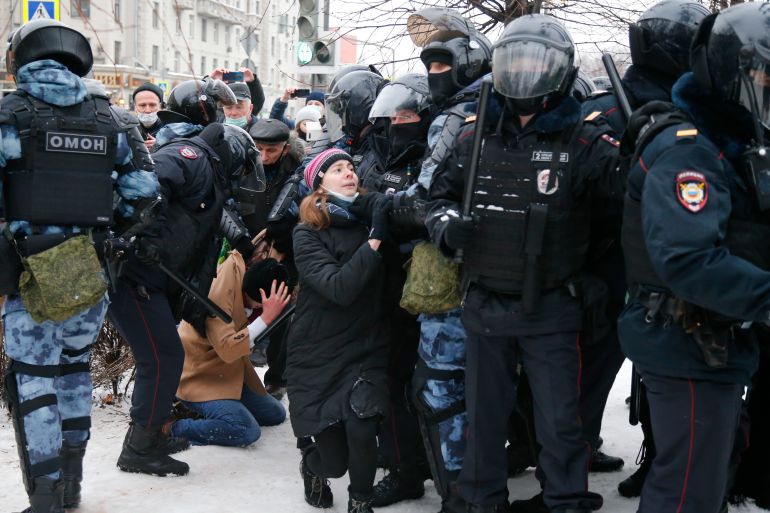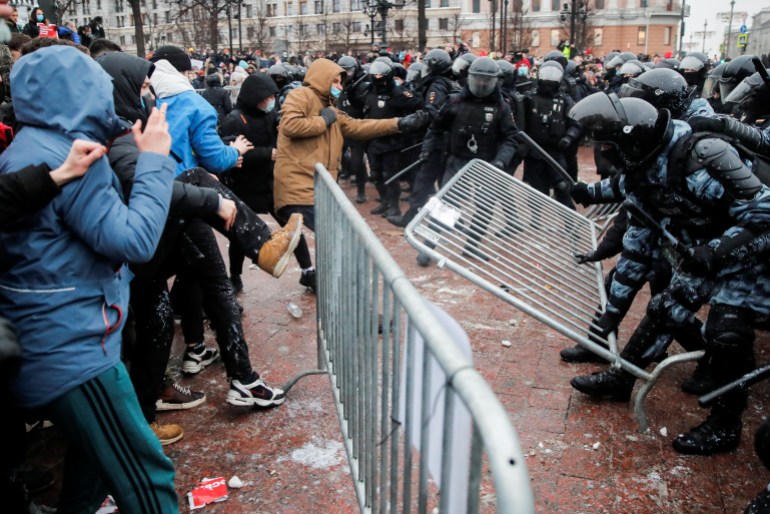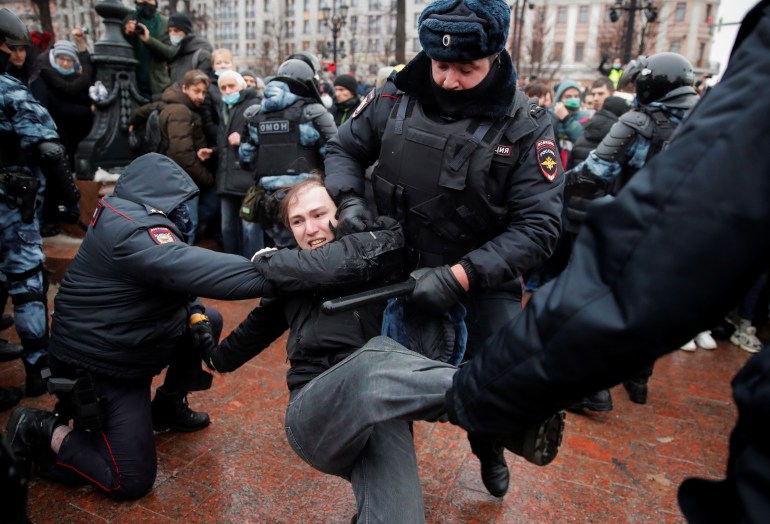Russia arrests thousands amid unprecedented pro-Navalny protests
Supporters of jailed opposition leader Alexey Navalny demand his release, defying bitter cold and a ban on protests.

Security forces detained more than 3,000 people and violently broke up rallies across Russia as tens of thousands of protesters ignored extreme cold and police warnings to demand the release of Kremlin critic Alexei Navalny.
Prosecutors in St Petersburg said in a statement late Saturday they were probing violations including “on the part of law enforcement” and the use of force against an unidentified woman.
Keep reading
list of 4 itemsWhat is Alexey Navalny’s endgame?
Alexey Navalny timeline: From poisoning to prison to death
Is President Putin afraid of Navalny?
The statement was released after local media published a video showing a middle-aged woman falling to the ground after being kicked by riot police.
In the video, a woman – identified as Margarita Yudina – is seen asking three policemen in full riot gear why they were detaining a young unarmed protester. One of the policeman than kicks her in the stomach.
A representative of Saint Petersburg’s Dzhanelidze hospital said Yudina was hospitalised Saturday night with a head injury.
“She is in a serious condition,” the hospital representative told AFP news agency on Sunday. “She’s in intensive care.”
Defying the ban
Navalny had called on his supporters to protest on Saturday after being arrested last weekend as he returned to Russia from Germany for the first time since being poisoned with a nerve agent that he says was applied to his underpants by state security agents in August.
Authorities had warned people to stay away from the protests, saying they risked catching COVID-19 as well as prosecution and possible jail time for attending an unauthorised event. But protesters defied the ban and bitter cold and turned out in force in more than 60 Russian cities.
The OVD-Info protest monitor group said at least 3,060 people – including 1,099 in the capital, Moscow and 386 in St Petersburg – had been detained across Russia, a number likely to rise.

In central Moscow, where an estimated tens of thousands of people had gathered in one of the biggest unauthorised rallies for years, police were seen detaining people, bundling them into nearby vans. The authorities said just some 4,000 people had shown up.
“There were violent clashes with the police using their batons to beat them down,” Al Jazeera’s Aleksandra Godfroid, reporting from Moscow, said.
Navalny’s wife, Yulia, said on social media she was detained at the rally and later released. Lyubov Sobol, a prominent aide of Navalny and lawyer, was also among those held.
Video of the moment when Navalny ally/lawyer Lyubov Sobol is grabbed by riot cops while speaking in Moscow. (Video by @tvrain) pic.twitter.com/dCY0nlLzgi
— Mike Eckel (@Mike_Eckel) January 23, 2021
Video footage from Vladivostok showed riot police chasing a group of protesters down the street, while demonstrators in Khabarovsk, braving temperatures of about -14C (7F), chanted “Shame!” and “Bandits!”
Police in the Siberian city of Yakutsk, one of the coldest cities in the world and where the temperature was -52C (-61.6 Fahrenheit) on Saturday, grabbed a protester by his arms and legs and dragged him into a van, video footage from the scene showed.
Speaking to Al Jazeera, Anna Matveeva, a researcher at King’s College London, underlined the importance of the wide geographic reach of Saturday’s protests.
“The police [are] brutal; there is nothing new about it,” Matveeva told Al Jazeera.
“But the fact that the geography of protests has spread all the way from Moscow to western Russia and also in northern states … we are seeing a consistent number of people coming out, knowing that they might be beaten, that they might be detained, that they will have criminal records. And notwithstanding that, people are [still] coming out.”
US condemns ‘harsh tactics’
The Investigative Committee, which probes major crimes, said in a statement it launched several preliminary probes into violence against law enforcement.
The United States condemned what it described as “harsh tactics” used against protesters and journalists and called for Navalny’s “immediate and unconditional” release.
“We call on Russian authorities to release all those detained for exercising their universal rights,” US State Department spokesman Ned Price said in a statement.
The European Union’s foreign policy chief, Josep Borrell, said in a post on Twitter that he deplored the authorities “disproportionate use of force”, while Britain’s foreign minister, Dominic Raab, condemned the “use of violence against peaceful protesters and journalists”.

Navalny, 44, is in a Moscow prison pending the outcome of four legal matters he describes as trumped up. He could face years in jail. Authorities accused him of violating the terms of a suspended sentence in a 2014 conviction for financial misdeeds, including when he was convalescing in Germany.
But Navalny accuses President Vladimir Putin of ordering his attempted murder. Putin has dismissed that, alleging the 44-year-old is part of a US-backed dirty tricks campaign to discredit him.
Dimitry Babich, a political analyst at the state-owned Rossiya Segodnya news agency accused Navalny of wanting special treatment when it came to the law.
“Mr Navalny is very authoritarian, he doesn’t listen to other people and he never made any political coalitions,” Babich told Al Jazeera from Moscow. “A lot of people are asking in Russia, why is Navalny treated differently from other people? Mr Navalny was allowed by Putin personally to go for treatment to Germany. Any Russian person would be arrested after missing a deadline for his or her return on a suspended sentence.”
Following Navalny’s arrest, his team released an investigation into a lavish Black Sea property allegedly owned by Putin, a claim the Kremlin denied.
The two-hour video report has been viewed more than 64 million times since its release on Tuesday, becoming the Kremlin critic’s most-watched YouTube investigation.
Navalny’s arrest drew widespread Western condemnation, with the US, the European Union, France and Canada all calling for his release.
On Saturday, Russia’s foreign ministry accused the US embassy in Moscow of publishing routes of planned demonstrations in support of Navalny and demanded an explanation from US diplomats.
“Yesterday the US embassy in Moscow published ‘protest routes’ in Russian cities and tossed around information about a ‘march on the Kremlin,'” foreign ministry spokeswoman Maria Zakharova wrote on Facebook. “US colleagues will have to explain themselves,” she added.
The US embassy in Moscow said it was following the rallies, adding that Washington supported “the right of all people to peaceful protest, freedom of expression”.
“Steps being taken by Russian authorities are suppressing those rights,” embassy spokeswoman Rebecca Ross said on Twitter.